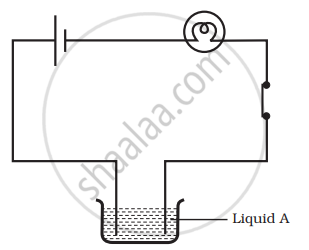Advertisements
Advertisements
Question
An electric current can produce
Options
heating effect
chemical effect
magnetic effect
chemical, heating and magnetic effects
Solution
chemical, heating and magnetic effects
Explanation -
When an electric current is passed through a conducting solution, it causes chemical reactions. The resulting effect is called chemical effect of current.
When an electric current is passed through a bulb, its filament gets heated to a high temperature and bulb starts glowing. The resulting effect is heating effect of current. Whenever an electric current te passed through a circuit, a magnetic field is produced around it. The resulting effect is magnetic effect of current. Thus, an electric current can produce chemical, heating and magnetic effects.
APPEARS IN
RELATED QUESTIONS
In an electrolyte the current is due to the flow of ______.
When electric current is passed through a conducting solution, there is a change of colour of the solution. This indicates
Which of the following metals is used in electroplating to make objects appear shining?
Paheli set up an experiment using liquid A in the beaker as shown in the figure. She observed that the bulb glows. Then, she replaced the liquid A by another liquid B. This time the bulb did not glow. Boojho suggested replacing the bulb by an LED. They observed that the LED glows. Explain.

Paheli wants to deposit silver on an iron spoon. She took silver nitrate (AgNO3) solution in a beaker and set up a simple circuit for electroplating. Which terminal of the battery should the spoon be connected to? What material should the other electrode be made of?
Why is tin electroplated on iron to make cans used for storing food?
A chemical reaction happens when electricity passes through various conducting liquids.
The most common industrial application of chemical effects of electric current is ______.
Match the following
| 1. | Anode | a. | Conducting solution |
| 2. | Cathode | b. | Positive terminal |
| 3. | Ions | c. | Negative terminal |
| 4. | Electrolyte | d. | Positively or negatively charged |
State some advantages of electroplating.
